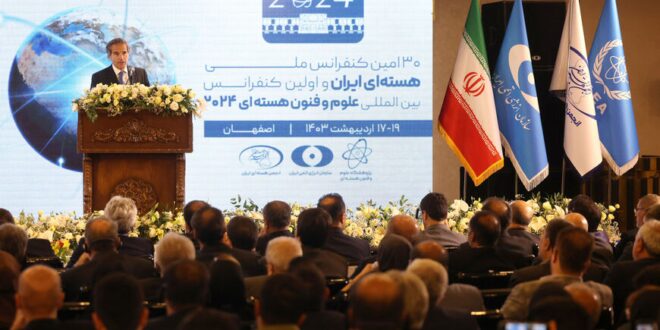The International Atomic Energy Agency’s 35-member board of governors has voted to censure Iran for the first time since November 2022.
The United States joined its European partners in censuring Iran at the United Nations’ nuclear watchdog on Wednesday, despite the Biden administration’s concerns that a formal rebuke of Tehran could backfire and lead to further nuclear escalation.
With 20 votes in favor, Russia and China voting against and 12 abstentions, the board of governors at the International Atomic Energy Agency in Vienna approved a resolution condemning Iran for not fully cooperating with nuclear inspectors.
Germany, France and Britain submitted the resolution to the agency’s 35-member board when its quarterly meeting kicked off Monday, but it was unclear at the time whether they would garner American support for the move. The United States and the three European powers, collectively known as the E3, have long coordinated on efforts to contain Iran’s rapidly advancing nuclear program.
The Biden administration was reluctant to take any action that could prompt Iran to ratchet up its nuclear program and further limit access to international inspectors. Had it voted against the European-led measure, however, the administration would have faced accusations in an election year that it was being too soft on Iran.
The US ambassador to the IAEA, Laura Holgate, said before the vote Wednesday that the United States would support the censure resolution “given Iran’s lack of cooperation with the IAEA and our commitment to collective action in support of the agency and the NPT,” referring to the Non-Proliferation Treaty of 1970 meant to prevent the spread of nuclear weapons.
But in a veiled reference to the Europeans, Holgate added, “Make no mistake, it is important that resolutions be tied to a broader strategy.”
The IAEA’s board of governors last censured Iran in November 2022, reprimanding it for not complying with a years-long investigation into man-made uranium particles discovered at several undeclared nuclear sites. In retaliation, Iran announced that it had started enriching uranium to 60% purity at its underground Fordow nuclear facility.
In a statement to Al-Monitor after the vote, Iran’s mission to the United Nations said the censure would have a “detrimental effect” on future engagement.
“The decision made by Western countries was both hasty and unwise, and it will undoubtedly have a detrimental effect on the process of diplomatic engagement and constructive cooperation,” the mission said.
Behnam Ben Taleblu, a senior fellow at the Foundation for Defense of Democracies, welcomed the Europeans’ use of diplomatic pressure against Iran but questioned what their end game is.
“Is this pressure to return to a fatally flawed deal, which is already fast expiring, or can and should this be an inflection point for the Europeans to build momentum towards snapback?” Taleblu said.
UN Resolution 2231, which enshrined the 2015 nuclear deal, allows its signatories to trigger a “snapback” of sanctions by filing a complaint to the Security Council if Iran is no longer abiding by its nuclear obligations. Considered by the West a measure of last resort, the option to restore sanctions on Iran expires in October 2025.
“The censure seems to amount to a feel-good measure for the West,” said Ali Vaez, Iran program director at the International Crisis Group. “It’s more likely to prompt Iranian nuclear escalation rather than cooperation.”
Absent cooperation from Iran before the next IAEA board meeting in September, “the West is likely to mandate a comprehensive report about Iran’s outstanding safeguards issues, which will kick the can down the road until after the US election,” Vaez said.
The original deal between Iran and world powers, known as the Joint Comprehensive Plan of Action, set curbs on the purity and amount of Iran’s enriched uranium stockpile in exchange for international sanctions relief. Iran began violating the accord after former President Donald Trump quit the JCPOA in 2018 and reimposed economic sanctions on Iran.
A recent IAEA report concluded that Iran’s stockpile of uranium enriched to near weapons-grade levels of 90% continues to grow. The agency said its uranium enriched up to 60% had increased by 20.6 kilograms (45.4 pounds) between February and May. The original nuclear deal limited Iran from enriching uranium beyond 3.67% purity.
The US intelligence community has assessed that Iran could amass enough fissile material to build three nuclear weapons within weeks if it decided to do so. Iran insists its nuclear program is for peaceful purposes only.
The IAEA censure comes as the Biden administration pursues back-channel diplomacy with Tehran to lower tensions over its nuclear program and support for regional proxies that have attacked US troops stationed in Iraq and Syria. Last month, US and Iranian officials held another round of secret, indirect talks in the Gulf state of Oman.
During a news conference in Beirut on Monday, acting Iranian Foreign Minister Ali Bagheri Kani acknowledged that the dialogue between the two adversaries continues.
“We have always continued our negotiations … and they have never stopped,” he said.
The IAEA censure comes weeks before Iran is set to hold a nationwide election to replace President Ebrahim Raisi, who was killed in a helicopter crash last month.
The 12-member Guardian Council will soon decide which of the presidential hopefuls can stand in the June 28 election. Those who have registered their candidacy include former President Mahmoud Ahmadinejad, current parliament speaker Mohammad Bagher Qalibaf, his conservative predecessor Ali Larijani and former nuclear negotiator Saeed Jalili.
The country’s indirect talks with the United States are expected to continue regardless of who is elected Iran’s next president, as both Tehran and Washington appear incentivized to put a lid on regional attacks that could pull them into direct military confrontation.
 Eurasia Press & News
Eurasia Press & News




